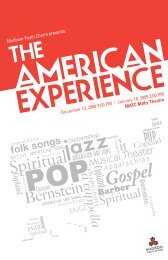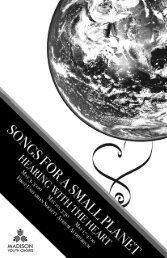Gathering Roses in Winter - Madison Youth Choirs
Gathering Roses in Winter - Madison Youth Choirs
Gathering Roses in Winter - Madison Youth Choirs
You also want an ePaper? Increase the reach of your titles
YUMPU automatically turns print PDFs into web optimized ePapers that Google loves.
Josqu<strong>in</strong>’s most famous frottola (a precursor to the madrigal) is a charm<strong>in</strong>g example ofmusical puns: the long bass note on “hold a long note,” and the alternat<strong>in</strong>g high andlow voices, the large leaps, and the fast patter, all of which imitate the squeak<strong>in</strong>g of thecricket. “Per amore” (for love) receives a flourish of vocal melisma. Even withoutunderstand<strong>in</strong>g this saucy Italian text, the sheer sound of the vocal texture delights theear.MADISON BOYCHOIRPalomita(sung <strong>in</strong> Spanish)Akornefa Akyea, fluteTraditional Lament from PeruArranged by Randal SwiggumLittle dove, where are you? Because I am look<strong>in</strong>g for you.Lonely, perhaps you cry, without a way to come back.My dove, I’ve lost you. I don’t know where you went.Desolate, I search for you, perhaps never to f<strong>in</strong>d you.A poignant melody which captures the melancholy and desolation of the text, Palomitahas been a favorite of the boychoir s<strong>in</strong>ce we started learn<strong>in</strong>g it at Fall Camp. The flutepart is rem<strong>in</strong>iscent of a lonely Andean panpipe player.Johnnie CopeKen JohnstonThe subject of this text is Sir John Cope (d. 1760), commander <strong>in</strong> chief of the Englisharmy defeated by Bonnie Pr<strong>in</strong>ce Charlie of Scotland at the Battle of Prestonpans, 22September 1745. Accord<strong>in</strong>g to legend, Cope secretly deserted his troops the nightbefore the battle and has been “skeired”(mocked) <strong>in</strong> this famous poem ever s<strong>in</strong>ce. Thepoem, well-known by Scottish schoolchildren, was composed by a literate farmer,Adam Skirv<strong>in</strong>g, whose fields were trampled <strong>in</strong> the battle. The martial music, with itsfanfares and march<strong>in</strong>g beat, was composed by Scottish composer Ken Johnston for theNational <strong>Youth</strong> Choir of Scotland <strong>in</strong> 2001. Learn<strong>in</strong>g to s<strong>in</strong>g the piece <strong>in</strong> Scots was awelcome challenge for the boychoir. “Hey, Johnnie, are ye wauk<strong>in</strong>’ yet?” means “Areyou awake yet?”




